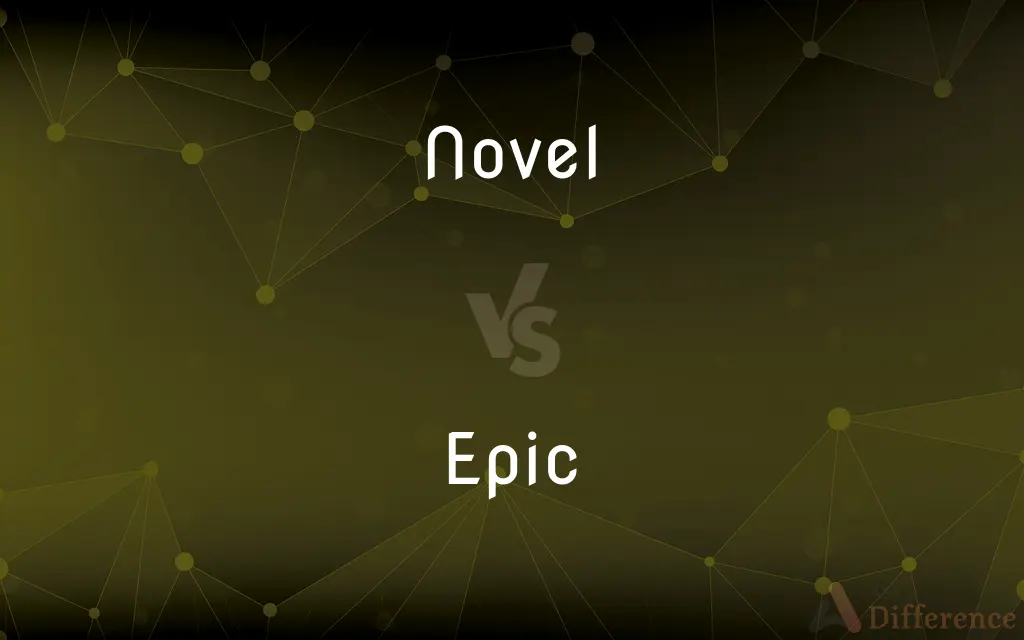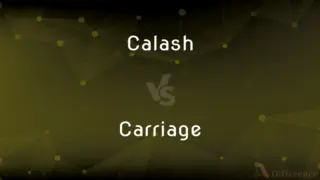Novel vs. Epic — What's the Difference?
By Tayyaba Rehman & Urooj Arif — Updated on March 25, 2024
A novel is a lengthy fictional narrative in prose, focusing on characters and plot, while an epic is a grand, often poetic tale of heroism and adventure.

Difference Between Novel and Epic
Table of Contents
ADVERTISEMENT
Key Differences
Novels and epics both tell stories, but they do so in different ways and with distinct focuses. A novel is a comprehensive narrative in prose that explores characters, plots, and settings in depth, offering readers insight into the human experience and personal growth. It is primarily written in prose and can cover any genre, allowing for a wide range of themes and styles. On the other hand, an epic is a lengthy narrative poem, emphasizing heroic actions and grand adventures, often involving gods, mythical creatures, and extraordinary humans. Epics are traditionally oral and serve to glorify the past and impart moral lessons.
While novels are a relatively modern form of literature, evolving with the rise of literacy and the printing press, epics date back to ancient times, serving as foundational texts for cultures and civilizations. This historical distinction underscores the novel's focus on individual experience and societal nuances, whereas epics are more concerned with collective identity and existential battles.
In terms of structure, novels are typically divided into chapters and paragraphs, with a focus on detailed character development and plot progression. This structure supports intricate narratives and complex themes. Epics, however, are often divided into books or cantos, using formal diction and stylized language to convey the grandeur and scale of their tales.
The narrative scope of novels allows for a detailed exploration of characters’ thoughts, emotions, and motivations, fostering a deep connection between the reader and the characters. In contrast, epics focus on the deeds and virtues of their protagonists, often at the expense of detailed character analysis, to inspire and educate their audience.
Comparison Chart
Form
Prose
Poetry
ADVERTISEMENT
Focus
Character development, plot complexity
Heroic deeds, moral and cultural values
Structure
Chapters and paragraphs
Books or cantos
Historical context
Modern era
Ancient times
Purpose
Entertain and provoke thought
Inspire and teach
Compare with Definitions
Novel
Offers deep insights into characters’ thoughts and motivations.
In modern novels, readers often find complex characters grappling with personal and societal issues.
Epic
Originates from oral storytelling traditions.
Many epics were passed down through generations before being written down.
Novel
Reflects contemporary concerns and artistic developments.
The 20th-century novel explores themes of alienation and existential doubt.
Epic
Embodies the ideals and values of a culture.
Epics like the ‘Mahabharata’ play a crucial role in conveying moral and ethical guidelines.
Novel
A long, fictional prose narrative that explores complex characters and themes.
The novel ‘War and Peace’ intricately weaves individual stories into the broader tapestry of historical events.
Epic
Uses elevated diction and structured form.
Epics are known for their formal language and use of literary devices like epithets.
Novel
Can encompass a wide range of genres and styles.
From science fiction to historical drama, novels offer a diverse palette of storytelling.
Epic
A lengthy narrative poem, often detailing heroic deeds and adventures.
Homer’s ‘Odyssey’ is an epic that recounts the adventures of Odysseus.
Novel
Elaborate descriptions create immersive worlds.
Novels like ‘The Lord of the Rings’ are celebrated for their detailed settings and imaginative worlds.
Epic
A series of events considered appropriate to an epic.
The book was an epic in four volumes.
Novel
A novel is a relatively long work of narrative fiction, typically written in prose and published as a book. The present English word for a long work of prose fiction derives from the Italian: novella for "new", "news", or "short story of something new", itself from the Latin: novella, a singular noun use of the neuter plural of novellus, diminutive of novus, meaning "new".Some novelists, including Nathaniel Hawthorne, Herman Melville, Ann Radcliffe, John Cowper Powys, preferred the term "romance" to describe their novels.
Epic
Often features gods, mythical creatures, and supernatural events.
The epic ‘Gilgamesh’ includes encounters with mythical beings and quests for immortality.
Novel
A fictional prose narrative of considerable length, typically having a plot that is unfolded by the actions, speech, and thoughts of the characters.
Epic
An extended narrative poem in elevated or dignified language, celebrating the feats of a legendary or traditional hero.
Novel
The literary genre represented by novels.
Epic
A literary or dramatic composition that resembles an extended narrative poem celebrating heroic feats.
Novel
Strikingly new, unusual, or different.
Epic
A series of events considered appropriate to an epic
The epic of the Old West.
Novel
Newly made, formed or evolved; having no precedent; of recent origin; new.
Epic
Of, constituting, having to do with, or suggestive of a literary epic
An epic poem.
Novel
Original, especially in an interesting way; new and striking; not of the typical or ordinary type.
Epic
Surpassing the usual or ordinary, particularly in scope or size
"A vast musical panorama ... it requires an epic musical understanding to do it justice" (Tim Page).
Novel
A work of prose fiction, longer than a novella.
Epic
Heroic and impressive in quality
"Here in the courtroom ... there was more of that epic atmosphere, the extra amperage of a special moment" (Scott Turow).
Novel
(historical) A fable; a short tale, especially one of many making up a larger work.
Epic
An extended narrative poem in elevated or dignified language, celebrating the feats of a deity, demigod (heroic epic), other legend or traditional hero.
The Icelandic epic took all night to recite.
Novel
(obsolete) A novelty; something new.
Epic
(computing) In software development, a large or extended user story.
Novel
A new legal constitution in ancient Rome.
Epic
Of or relating to an epic.
Beowulf is an epic poem.
Novel
Of recent origin or introduction; not ancient; new; hence, out of the ordinary course; unusual; strange; surprising.
Epic
Momentously heroic; grand in scale or character
The epic defense was rewarded with the highest military decorations
Novel
That which is new or unusual; a novelty.
Epic
Extending beyond the usual or ordinary.
The after-prom party was truly epic.
You made an epic mistake.
Novel
News; fresh tidings.
Some came of curiosity to hear some novels.
Epic
That is an epimorphism.
Novel
A fictitious tale or narrative, longer than a short story, having some degree of complexity and development of characters; it is usually organized as a time sequence of events, and is commonly intended to exhibit the operation of the passions, and often of love.
Epic
Narrated in a grand style; pertaining to or designating a kind of narrative poem, usually called an heroic poem, in which real or fictitious events, usually the achievements of some hero, are narrated in an elevated style.
The epic poem treats of one great, complex action, in a grand style and with fullness of detail.
Novel
A extended fictional work in prose; usually in the form of a story
Epic
A long narrative poem telling of a hero's deeds
Novel
A printed and bound book that is an extended work of fiction;
His bookcases were filled with nothing but novels
He burned all the novels
Epic
Very imposing or impressive; surpassing the ordinary (especially in size or scale);
An epic voyage
Of heroic proportions
Heroic sculpture
Novel
Of a kind not seen before;
The computer produced a completely novel proof of a well-known theorem
Epic
Constituting or having to do with or suggestive of a literary epic;
Epic tradition
Novel
Pleasantly novel or different;
Common sense of a most refreshing sort
Common Curiosities
Are all epics ancient?
While most traditional epics are ancient, the epic form can be used in modern times to convey grand narratives.
Do novels always have a complex plot?
While many novels feature complex plots, some focus more on character exploration or thematic development.
What defines a novel?
A novel is a lengthy work of fiction in prose that explores characters, plots, and themes in depth.
How is an epic different from a novel?
An epic is a long narrative poem focusing on heroic deeds and adventures, often with a moral or cultural lesson, whereas a novel is a prose narrative emphasizing character development and plot.
Can a novel be written in verse?
While traditionally prose, some novels, known as verse novels, are written in poetic form.
How do epics influence society?
Epics influence society by reinforcing cultural norms, inspiring moral conduct, and fostering a sense of shared identity.
Do novels have a specific format?
Novels are typically written in prose and divided into chapters, but the format can vary depending on the author’s style.
What is the role of gods in epics?
Gods often play a crucial role in epics, influencing events and embodying cultural values and beliefs.
Can a novel be based on true events?
Yes, novels can be inspired by true events but are characterized by their fictional elements and interpretations.
Is character development important in epics?
While not as deeply explored as in novels, character development in epics is crucial for demonstrating heroic virtues.
How do settings in novels contribute to the story?
Settings in novels not only ground the story in a specific time and place but also enhance the narrative’s mood and themes.
How long is a typical novel?
Novels vary in length but typically range from 50,000 to 100,000 words.
Can epics be considered historical documents?
While not strictly historical documents, epics provide valuable insights into the cultures and values of their times.
Why are epics important culturally?
Epics often serve as foundational texts that encapsulate the ideals, values, and history of a culture.
What themes do epics typically explore?
Epics often explore themes of heroism, morality, and the human condition against a backdrop of grand adventures.
Share Your Discovery

Previous Comparison
Calash vs. Carriage
Next Comparison
Dog vs. GirlAuthor Spotlight
Written by
Tayyaba RehmanTayyaba Rehman is a distinguished writer, currently serving as a primary contributor to askdifference.com. As a researcher in semantics and etymology, Tayyaba's passion for the complexity of languages and their distinctions has found a perfect home on the platform. Tayyaba delves into the intricacies of language, distinguishing between commonly confused words and phrases, thereby providing clarity for readers worldwide.
Co-written by
Urooj ArifUrooj is a skilled content writer at Ask Difference, known for her exceptional ability to simplify complex topics into engaging and informative content. With a passion for research and a flair for clear, concise writing, she consistently delivers articles that resonate with our diverse audience.















































